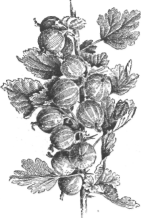GOOSEBERRY 78l GORDON
Description
This page of the book is from "The New Student's Reference Work: Volume 2" by Chandler B. Beach, Frank Morton McMurry and others.
GOOSEBERRY 78l GORDON
stock from which tame geese have been derived. The American White Fronted Goose, Prairie Brant, Gray Brant or Laughing Goose, is a wild goose familiar on the Pacific coast and in the interior, but rare in the east. It migrates in the spring and autumn, utters a resounding cackle. The Snow Goose, a splendid bird but fast disappearing, very rare in the east, is clothed in plumage all snow-white save for gray wing-coverts and blackish wing-tips. It migrates in spring and fall. The Brant or Barnacle Goose is common on the Atlantic coast. The upper plumage is black and brownish-gray; lower breast whitish, upper part of breast black. It is fond of the sea, usually migrates over the water, is seldom seen far inland. At low tide the birds wade about the marshes feeding, the young ones eagerly hunted by the sportsmen. A very similar bird, the Black Brant, belongs to the west.
Ooose'berry. Plants which, associated with currants, form the genus Ribes, which
contains about 60 species, chiefly natives of north temperate regions. Over 50 species are found in North America, about 40 of them being western. The gooseberry is said to have been cultivated for only about 300 years, and chiefly in England, where numerous magnificent varieties have been developed. In America their culture has been much neglected. There are two general types in cultivation : The European (R. grossularia), with thick glossy leaves and large variously colored fruit; and the American, with thinner leaves and small reddish-green fruit shading to purple.
Qoph'er, a small burrowing rodent, the name used differently in different localities. Gophers do much damage to vegetation, and are considered a great pest by the farmers. The Red Pocket-Gopher commits its depredations in the fertile prairie region of the Mississippi Valley. It is about as long as a small rat, the body considerably thicker; in the skin of the cheek is a large pocket or pouch in which to carry its store, on each forefoot a set of long claws. The word gopher is a corruption of the French gaufre, meaning honeycomb. Natural enemies are the weasel and the

gooseberry
gopher-snake. Farmers try to keep their numbers down by traps and poison. The name gopher is applied also to the ground squirrels, the spermophiles (seed-lovers) ; a familiar species is the little animal whose back and sides are marked with stripes of dark brown and yellow, the brown stripes having conspicuous yellow spots. It ranges north into Canada, south as far as Texas, but is not found west of the Rockies. It burrows into the earth below the frost line, carries seed in its pouches for storing in its burrow, and sleeps during the coldest weather.
Qor'dian Knot. The Phrygians, looking for a king, were told by the oracle of Delphi to choose the first person riding in an ox-cart toward the temple of Jupiter. This person was a poor peasant named Gordius. He dedicated his oxen and cart to Jupiter, and tied the yoke with a hard knot, and the oracle declared that whoever should unloose the knot would be ruler of Asia. When Alexander the Great came to Gordium, where the oxen were, he cut the knot with his sword and applied the prophecy to himself.
Qor'don, Charles Qeorge. England's glory and England's shame is "Chinese" Gordon, "Gordon Pasha," "Gordon the Christian Hero"—England's glory that it gave such a man birth and had his life-long, devoted service, and England's shame that she sent him to his death. It was a nation's criminal blunder that left him to perish at Khartum, and the nation paid for it with fifteen years of warfare with savage fanatics, thousands of lives and hundreds of thousands of treasure.
Son of Lieut.-Gen. Henry W. Gordon of the royal artillery, this modern Sir Galahad of stainless fame was born at the military post at Woolwich, England, Jan. 28, 1833. At twenty-one, as a lieutenant in the royal engineers, he was in the Crimea. In the battle of Balaklava, famous for the charge of the light brigade, young Gordon won British and Turkish medals and the French order of the Legion of Honor, for conspicuous bravery, together with the rank of captain. In i860 he commanded the royal engineers in the allied armies in China and was made a brevet-major. Then he was called to Shanghai to help defend that British post against the Taiping rebels. The rebellion was of so barbarous a character and the Chinese government so helpless, that the British in Shanghai raised an army at their own expense and placed Gordon in command of it. Governor Li Hung Chang, the great Chinese statesman, created him a mandarin. After two years' hard fighting in 30 battles, the rebellion was stamped out, but it sprang to life again when Governor Li treacherously murdered the leaders who had surrendered under Gordon's promise of


